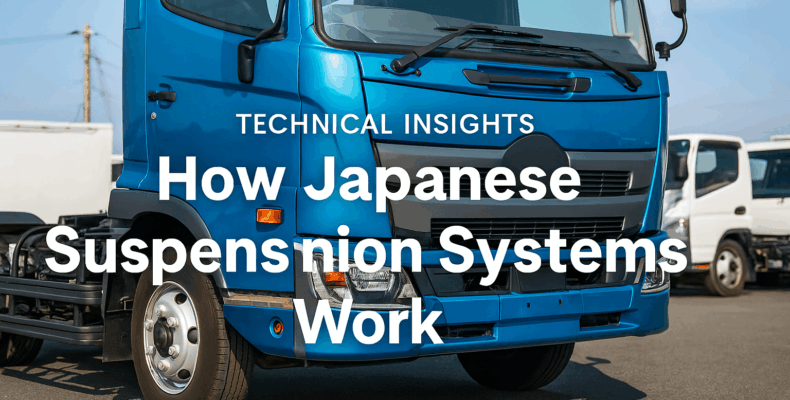How Japanese Truck Suspension Systems Deliver Smooth, Reliable Performance
Japanese trucks are known for being durable, fuel-efficient, and well-built. However, one feature that often gets overlooked is the suspension system. This component plays a major role in ensuring a smooth, safe, and stable ride—especially when carrying heavy cargo.
In this article, we’ll explain how Japanese truck suspension systems work, why they matter for global importers, and what makes them a smart investment for your business.
1. What Is a Truck Suspension System?
Simply put, a suspension system is the connection between the truck’s body and its wheels. It includes springs, shock absorbers, and linkages that help absorb bumps and uneven surfaces.
In fact, without a suspension system, trucks would bounce uncontrollably on rough roads. This would damage cargo and cause driver fatigue.
2. Types of Suspension Used in Japanese Trucks
Japanese trucks are engineered with different suspension setups depending on their size and purpose. Here are the most common types:
● Leaf Spring Suspension
This is the most traditional system. It uses stacked metal strips to support the load.
-
Advantages: Simple, durable, and low-cost.
-
Used in: Hino Ranger, Isuzu Elf, Mitsubishi Canter.
● Air Suspension
This system uses air-filled bags to support the truck’s weight.
-
Advantages: Superior ride comfort and load leveling.
-
Used in: Long-distance trailers and luxury buses.
● Coil Spring Suspension
Though less common in trucks, some light-duty vehicles use coil springs.
-
Advantages: Compact and smoother ride.
-
Used in: Some models of Toyota Dyna or Nissan Caravan.
Moreover, Japanese manufacturers sometimes combine leaf and air suspensions for better results.
3. Key Benefits for Global Buyers
Japanese suspension systems are built with real-world needs in mind. Here’s what makes them valuable to importers:
-
Smooth Ride: Reduces shock on cargo and driver fatigue.
-
Stability: Keeps trucks level, even on rough roads.
-
Long Life: Designed with quality materials.
-
Load Handling: Manages heavy cargo without sagging.
-
Easy Maintenance: Spare parts are widely available.
As a result, these systems are perfect for both urban and off-road transport.
4. Popular Japanese Trucks with Great Suspension
Here are some trusted Japanese trucks known for their excellent suspension setups:
| Model | Suspension Type | Ideal Use |
|---|---|---|
| Hino Ranger | Leaf + optional air | Regional cargo delivery |
| Isuzu Forward | Leaf spring | Construction and freight |
| Mitsubishi Fuso | Air suspension options | Long-distance logistics |
| Toyota Dyna | Coil or leaf spring | Small business delivery |
| Nissan Atlas | Leaf spring | Urban routes and tight turns |
For example, the Isuzu Forward handles well on rural roads due to its stable leaf setup.
5. Trusted Exporters of Japanese Used Trucks
When importing a truck, you need more than just a good model—you need a trusted exporter.
We recommend these experts:
👉 Top 5 Trusted Japanese Used Truck Exporters for Global Buyers
These companies offer:
-
Careful inspections
-
Quality control
-
Global shipping support
-
Honest pricing
Furthermore, they’ve helped customers from over 100 countries worldwide.
6. Final Thoughts: Smooth Suspension = Smarter Investment
To recap:
-
Japanese truck suspension systems are engineered for stability and comfort.
-
They suit a wide range of business needs, from delivery to long-haul.
-
Whether you choose leaf, air, or a combo, you’ll get performance and durability.
So, when buying your next truck, don’t ignore the suspension. It’s not just about the engine—it’s about how your truck feels and performs every day.
Start your import journey now with a truck that supports your business from the ground up.
